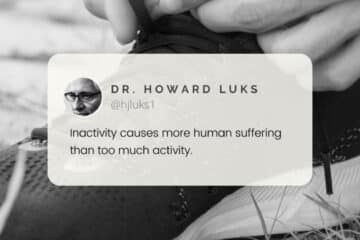
The role of an orthopedic surgeon is going to evolve and change dramatically over the next 5-10 years. It might occur sooner than that. We as a group of specialists can sit by and wait, or we can be the change that is necessary.
Everyone is talking about value-based care and a resultant decrease in the cost of care. These people, however, are missing the big picture. They are talking about layering further changes on to a very broken system. Instead, the system needs to change. Your zip code should not determine your health or your access to quality care. You should not be food insecure. Food should be a prescribed and “covered” portion of our healthcare spending. Telemedicine or just everyday modern medicine (telemedicine is a silly term) should be able to deliver much of the needs of rural or at-risk populations.
I am not alone in this way of thinking. Many integrated health systems have proven that these models are actionable and successful. Scale, and pushing back against the well-aligned huge lobbies who will rally against these changes will be an enormous undertaking. Many specialties will have a seat front and center to the changes that are coming. Orthopedic surgeons could be uniquely positioned to have a significant role in the reinventing of healthcare. I believe that orthopedic surgeons are in a unique position, and I am going to briefly dive into why I think we can dramatically impact the lives of the patients under our care – more so than many of our primary care colleagues.
For many of my primary care colleagues, discussing weight loss and lifestyle modification is similar in context to trying to explain climate change with people. If you are asking people to modify their lifestyle without an evident and timely need for them, then it is not likely that you are going to convince many of these people that modification of their lifestyle is worth it to them. Extending their life, much like extending the life of our time on this planet are too far off in the future for people to devote their time and energy to today. As Timothy Morton discussed in Hyperobjects, re-framing the way our patients see their health-related issues in the context of how they feel today dramatically impacts their desire to respond to our suggested changes.
Social and behavioral scientists understand the critical features of an issue that get people to react. People respond to things that are soon, salient and certain. That describes the scenario that many of the patients before us are experiencing. Their knee or hip pain is here, and now, it’s salient to their quality of life, and there is no debate about the inevitable progression of disability.
Reimagining the role of the orthopedic surgeon
Medical researchers have published many papers about the risks and complications of operating on the morbidly obese. Some surgeons brag about the fact that they can place a knee replacement into a patient with a BMI of 50. As I frequently discuss with patients, the proper question is not “can I perform the operation?”, the proper question is “should I operate?”
Sure, I can place a knee replacement into someone with a BMI of 50. However the complication rate of surgery on obese patients is dramatically higher, and the success rate is lower. Long ago I started with a different approach. I took the time to engage many of my patients and to teach them about a lot of the lifestyle changes available to them that would in all likelihood substantially improved their knee pain, regardless of the appearance of their X-rays.
Without getting into specifics, we have had many patients stop smoking, lose more than 50-100 pounds, and significantly increase their activity level and participation in resistance-based exercise programs. We teach that a caloric deficit is needed for weight change. We try to steer them away from warring diet tribes. We emphasize using water instead of any of the other sugar-laden drinks available. We also encourage people to “make their day a little harder.” For some of these patients, although their knee pain improved, they still went on to require a knee replacement. However, the majority of these people avoided knee replacement surgery because their pain relief from weight loss, and resistance exercise, was substantial.
I do not know the specific percentage of patients in a primary care doctor’s office who take any advice seriously and go on to lose significant weight. I can’t imagine it being much. I do know that a considerable number of patients with severe knee pain, who are looking at knee replacement surgery in the very near future are very engaged and highly motivated. I have been very impressed with the number of people who have taken on the challenge to modify their lifestyle, improve their eating habits, attend dedicated weight loss sessions, learn how to prepare healthier foods, and institute an appropriate resistance and aerobic exercise program.
This post is by no means a scientific study. I think that as orthopedic surgeons we often have a highly motivated patient sitting before us. These patients are often in a significant amount of pain. If we re-frame the discussion away from surgery and offer proper guidance, then you will find that these patients will often listen to your advice – if not to avoid surgery then at least to make the operation much safer. Their issue is soon, salient and certain.
Do you have questions regarding an Orthopedic injury or longevity?
Do you want to talk to an expert who can listen to you for 45-60 minutes and explain the options in detail?
Dr. Howard Luks offers remote guidance sessions to review your X-ray or MRI images and explain your options.
Dr. Luks has also received hundreds of requests for educational sessions on the topics discussed in his book, Longevity Simplified.
To date, I have been thoroughly impressed with the number of patients who have committed to significant dietary changes, decreased consumption of simple carbs, decreased intake of soda, juices, and sports drinks, and have dramatically improved their hemoglobin A1c. Their knee pain, as well as their reliance on medications to manage diabetes and hypertension, have likewise diminished significantly.
We as orthopedic surgeons can sit back and try to adapt to the changes that will come over the next few years. We can have our Academy fight these changes, or we can try and generate the data necessary to support the need for orthopedic surgeons to be the primary care practitioner of the musculoskeletal system. Collectively we could have a dramatic impact on the lives of the patients we see in our office. We are uniquely positioned to improve the lives of our patients, improve the health of our patients, decrease the cost of healthcare, decrease the utilization of medications and surgery to manage disease and help put medicine on a more sustainable course.











